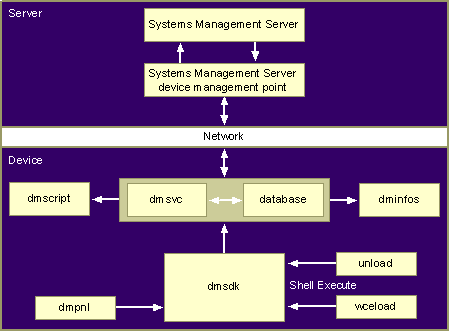 Important: Important: |
|---|
| This is retired content. This content is outdated and is no longer being maintained. It is provided as a courtesy for individuals who are still using these technologies. This content may contain URLs that were valid when originally published, but now link to sites or pages that no longer exist. |


The following illustration shows the relationship between the items that make up the device management solution.

On the device (client) side, the items that are necessary are dmsvc, the database file, dmscript, dminfos, dmpnl, and dmsdk. On the server side, the items that are necessary are the server and device management point.
The following table shows the items that implement the complete device management solution.
| Item | Description |
|---|---|
|
Systems Management Server |
Microsoft Systems Management Server, or another server that can support the protocol requirements of the Device Management Client. |
|
Systems Management Server Device Management Feature Pack |
This is the communication point for the device clients and the point of contact between the device client and the Systems Management Server. |
|
dmsvc |
This is the device management engine. It runs as a service. This production component handles all aspects of the device management protocol. It communicates by using HTTP/HTTPS over TCP/IP. This component uses XML in the protocol and has a built-in limited XML parser. This component is implemented as a private DLL. |
|
database file |
This production file is an internal database used by the device management engine to maintain state information about packages, like the package ID, package name, and download status of the package. |
|
dmscript |
This is the script engine to execute device management-specific script commands. These script commands are contained in a file with a .dms extension. This production component is implemented as a private executable file. For information about Device Management Client scripting, see Script Supportand Device Management Client Script Engine Commands. |
|
dminfos |
This production component supplies the device management engine with device ID, device hardware, and state information. Source for this component is available in %_WINCEROOT%\Public\Datasync\Oak\Devmgmt\Dminfos. |
|
dmpnl |
This is the default Control Panel application that is used to initialize the device management service, provision the device management system, and optionally install any applications. This production component uses dmsdk to perform different functions, such as access the package database, start the client, stop the client, and schedule a download task. An OEM may extend this component or replace it with a customized Control Panel. Source for this component is available in %_WINCEROOT%\Public\Wceshellfe\Oak\Ctlpnl\Dmpnl. |
|
dmsdk |
This private DLL exposes APIs that provide access to the device management engine and the database file. |
|
unload |
This optional item is used to uninstall applications. |
|
wceload |
This optional item is used to install CAB files. |








 See Also
See Also